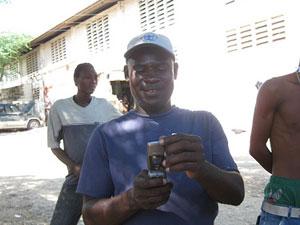Cell phones help aid groups in Haiti
Cell phone in Haiti (image by todkat03 (cc:by-nc-sa))
This story was originally reported by PRI’s “The World.” For more, listen to the audio above.
Watching the response to the recent earthquake in Haiti, Jean Orelien got frustrated. It seemed to him that aid groups had no idea what was going on. So Orlean, who grew up just outside Port au Prince and now runs a North Carolina-based company called SciMetrika, contacted the group Statistics without Borders for help. He told PRI’s “The World:”
We have the science. We have people that have the know-how that can help provide estimates that people can rely upon. I thought that this would be the contribution that I could make as a Haitian American and a statistician.
The group set out to collect economic data to figure out how aid organizations could help. They found that their normal method of collecting data — knocking on doors — wasn’t working well. On the other hand, they also noticed that a huge number of Haitians were carrying around an ideal tool for collecting data: cell phones.
Since then, the group has been conducting surveys over cell phones, and many Haitians have been eager to take part. “We actually have had people call back,” Orlean told The World.” “You never get somebody to call you back in the U.S.”
There are some 4 billion cell phones in the world, according to the International Telecommunications Union, one for more than half of the world’s population. The Economist reported in 2008 (subscription required): “A device that was a yuppie toy not so long ago has now become a potent force for economic development in the world’s poorest countries.”
Throughout the world, and especially in Africa, aid groups are using cell phones for mobile banking, improving health care, collecting market information, and for education and adult literacy. The phones have the potential to transform economic development, according to Jenny Aker, speaking with the Center for Global Development. But she cautions, “they’re not the silver bullet.”
Cell phones and other information technology can’t replace investment in public goods, health and education, Aker stresses, but they can help. And for Americans who want to help out, too, programs like Phones for Haiti are constantly turning people’s old cell phones into forces for economic good.
PRI’s “The World” is a one-hour, weekday radio news magazine offering a mix of news, features, interviews, and music from around the globe. “The World” is a co-production of the BBC World Service, PRI and WGBH Boston. More “The World.”
Every day, reporters and producers at The World are hard at work bringing you human-centered news from across the globe. But we can’t do it without you. We need your support to ensure we can continue this work for another year.
Make a gift today, and you’ll help us unlock a matching gift of $67,000!
